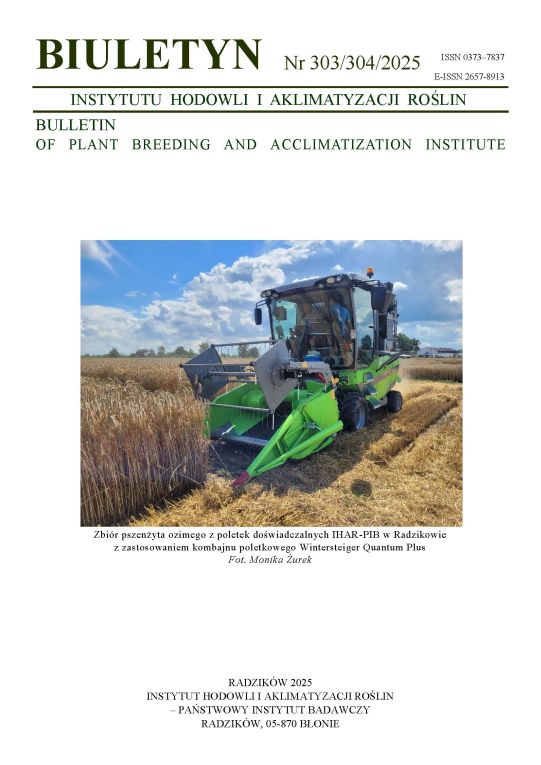Research on influence of brassinosteroids on tolerance of barley plants to drought stress
Damian Gruszka
damian.gruszka@us.edu.plUniwersytet Śląski, Wydział Biologii i Ochrony Środowiska, Katedra Genetyki (Poland)
Supporting Agencies
Prace zostały wykonane w ramach badań podstawowych na rzecz postępu biologicznego w produkcji roślinnej na podstawie decyzji Ministra Rolnictwa i Rozwoju Wsi nr HOR.hn.802.7.2018, Zadanie 24.
Keywords:
brasinosteroidy, jęczmień, suszaReferences
Dockter C., Gruszka D., Braumann I., Druka A., Druka I., Franckowiak J., Gough S.P., Janeczko A., Kurowska M., Lundqvist J., Lundqvist U., Marzec M., Matyszczak I., Müller A.H., Oklestkova J., Schulz B., Zakhrabekova S., Hansson M. 2014. Induced variations in brassinosteroid genes define barley height and sturdiness, and expand the green revolution genetic toolkit. Plant Physiol. 166: 1912 — 1927.
Gruszka D., Janeczko A., Dziurka M., Pociecha E., Oklestkova J., Szarejko I. 2016. Barley brassinosteroid mutants provide an insight into phytohormonal homeostasis in plant reaction to drought stress. Front. Plant Sci. 7: 1824.
Gruszka D., Janeczko A., Dziurka M., Pociecha E., Fodor J. 2018. Non-enzymatic antioxidant accumulations in BR-deficient and BR-insensitive barley mutants under control and drought conditions. Physiol. Plant. 163: 155 — 169. Google Scholar
Gruszka D., Janeczko A., Dziurka M., Pociecha E., Oklestkova J., Szarejko I. 2016. Barley brassinosteroid mutants provide an insight into phytohormonal homeostasis in plant reaction to drought stress. Front. Plant Sci. 7: 1824.
Gruszka D., Janeczko A., Dziurka M., Pociecha E., Fodor J. 2018. Non-enzymatic antioxidant accumulations in BR-deficient and BR-insensitive barley mutants under control and drought conditions. Physiol. Plant. 163: 155 — 169. Google Scholar
Gruszka, D. . (2019) “Research on influence of brassinosteroids on tolerance of barley plants to drought stress”, Bulletin of Plant Breeding and Acclimatization Institute, (286), pp. 105–110. doi: 10.37317/biul-2019-0023.
Authors
Damian Gruszkadamian.gruszka@us.edu.pl
Uniwersytet Śląski, Wydział Biologii i Ochrony Środowiska, Katedra Genetyki Poland
Statistics
Abstract views: 266PDF downloads: 311
License

This work is licensed under a Creative Commons Attribution-ShareAlike 4.0 International License.
Upon submitting the article, the Authors grant the Publisher a non-exclusive and free license to use the article for an indefinite period of time throughout the world in the following fields of use:
- Production and reproduction of copies of the article using a specific technique, including printing and digital technology.
- Placing on the market, lending or renting the original or copies of the article.
- Public performance, exhibition, display, reproduction, broadcasting and re-broadcasting, as well as making the article publicly available in such a way that everyone can access it at a place and time of their choice.
- Including the article in a collective work.
- Uploading an article in electronic form to electronic platforms or otherwise introducing an article in electronic form to the Internet or other network.
- Dissemination of the article in electronic form on the Internet or other network, in collective work as well as independently.
- Making the article available in an electronic version in such a way that everyone can access it at a place and time of their choice, in particular via the Internet.
Authors by sending a request for publication:
- They consent to the publication of the article in the journal,
- They agree to give the publication a DOI (Digital Object Identifier),
- They undertake to comply with the publishing house's code of ethics in accordance with the guidelines of the Committee on Publication Ethics (COPE), (http://ihar.edu.pl/biblioteka_i_wydawnictwa.php),
- They consent to the articles being made available in electronic form under the CC BY-SA 4.0 license, in open access,
- They agree to send article metadata to commercial and non-commercial journal indexing databases.













